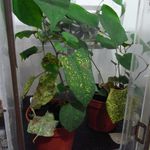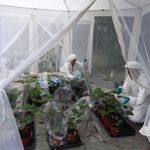EVALUATING THE MYCOHERBICIDE POTENTIAL OF A LEAF-SPOT PATHOGEN AGAINST JAPANESE KNOTWEED
←
→
Page content transcription
If your browser does not render page correctly, please read the page content below
EVALUATING THE MYCOHERBICIDE
POTENTIAL OF A LEAF-SPOT
PATHOGEN AGAINST JAPANESE
KNOTWEED
Locations Canada, Netherlands, United Kingdom
Dates 31/01/2016 - 31/12/2021
Summary Japanese knotweed is a highly invasive weed that impacts severely on native
biodiversity and local infrastructure in its introduced range. Whilst chemicals are
currently used to control the weed, this approach is costly and unsustainable.
Biological control is an alternative method. The damaging leaf-spot fungus,
Mycosphaerella polygoni-cuspidati, which attacks the plant in its native range
was found not to be suitable as a classical biocontrol agent. However, the
pathogen is considered to hold potential as a mycoherbicide. The aim of this
project is to undertake proof-of-concept research into a potential mycoherbicide,
in collaboration with the private industry.The problem Japanese knotweed (Fallopia japonica) is a highly invasive species in the UK,
mainland Europe, North America and parts of Oceania.
Introduced from Japan in the mid-19th century as a prized ornamental, the plant
species soon became problematic in its entire exotic range exerting detrimental
impacts on both the biodiversity and local infrastructures.
Due to its ability to form dense monocultures and to regrow from tiny fragments
of rhizome, Japanese knotweed is often governed by special legislation in
individual countries, like in the UK where it is illegal to cause it to grow in the
wild (Wildlife and Countryside Act 1981).
Currently, the weed can be partially controlled using chemicals however, this is
costly and considered as unsustainable due to the ease of spread of the
invasive, and the increasing restrictions in the use of herbicides in many
countries.
Classical biological control programmes targeting Japanese knotweed were
initiated in the UK and the USA in 2000, shortly followed by Canada in 2007.
From the suite of natural enemies associated with Japanese knotweed in its
centre of origin, the psyllid, Aphalara itadori, and the fungal leaf-spot pathogen,
Mycosphaerella polygoni-cuspidati, were selected as having the highest
potential as biocontrol agents. The psyllid has already been released in the UK
and in Canada, while the leaf-spot pathogen is still undergoing evaluation as a
potential agent.
What we are doing The fungal leaf-spot, Mycosphaerella polygoni-cuspidati, is a damaging
pathogen of F. japonica which is common and widespread on its host in the
native range.
A thorough evaluation showed that the pathogen is not suitable as a classical
biocontrol agent for Japanese knotweed as it can cause restricted disease
symptoms on a couple of non-target plant species under quarantine greenhouse
conditions. However, the pathogen is thought to hold promise as a
mycoherbicide due to its genetic and biological properties.
Such potential mycoherbicide would be based on a single-mating type isolate
allowing targeted application while preventing the fungus from reproduction,
persistence and spread in the field.
To protect this idea, international patent applications held in the name of the
Secretary of State for Environment, Food and Rural Affairs, UK (DEFRA) have
been filed and published, and a European patent has already been granted.
Building on previous work, the aim of this project is to undertake “proof of
concept” research into the potential mycoherbicide in collaboration with the
private industry to assess the scope for, and, hopefully, ultimately develop a
product which could be applied in much the same way as a herbicide.Results so far The Mycosphaerella leaf-spot can easily be mass-produced as fungal mycelium
in liquid culture, retaining its viability and virulence. Freeze-drying, routinely used
to increase the shelf-life of fungal propagules, was found unsuitable to preserve
the viability of mycelial fragments of the pathogen long-term. Thus, the focus
shifted to trying to induce the formation of microsclerotia, durable structures,
which enable fungi to survive adverse conditions. If successful, the next step
would be to assess these structures with the view to the performance of the
agent in the field and to its shelf-life.
Inoculation studies with the leaf-spot, using mass produced mycelial inoculum,
were first conducted under standardized quarantine greenhouse conditions.
Under these conditions, application of mycelial fragments to Japanese knotweed
plants consistently led to the development of necrotic leaf-spots and could affect
the growth habit of treated plants. Based on a pest-risk-assessment, permission
to release the pathogen from quarantine was granted by the relevant UK
authorities in July 2019.
Subsequent experimental field trials conducted with potted Japanese knotweed
plants in tents in the grounds of CABI UK showed that the pathogen is also able
to infect and develop disease symptoms on its host under these more natural
conditions. Repetition of the field trial in 2020 will help to gather further data of
the disease development of M. polygoni-cuspidati on Japanese knotweed in this
experimental set up. In collaboration with a commercial company, the leaf-spot
pathogen is currently undergoing a parallel assessment in the Netherlands.
Donors Dutch Waterboards and other authorities, British Columbia Ministry of Forests,
Lands and Natural Resource Operations (Canada), Department for
Environment, Food and Rural Affairs (Defra), CABI Development Fund (CDF)
Partners Agriculture and Agri-Food Canada - Lethbridge Research and Development
Centre, A major biocontrol company
CABI Project Manager Marion Seier
https://www.cabi.org/what-we-do/cabi-
projects/You can also read






















































